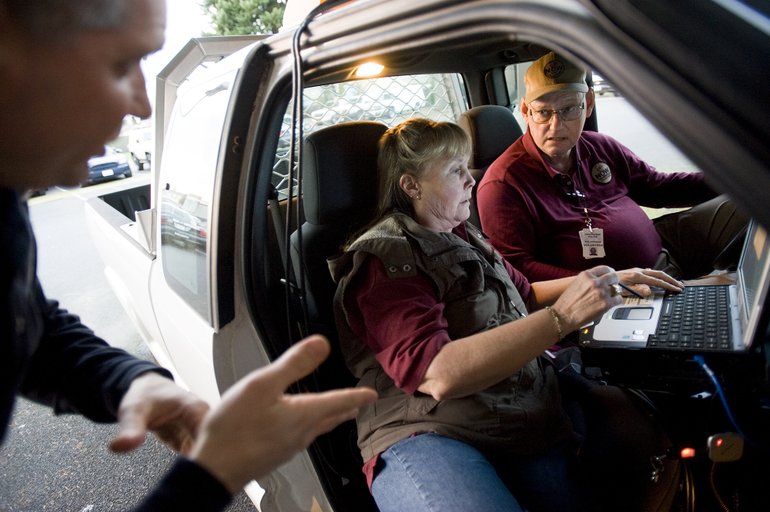Police were knocking, but no one was home.
“Vancouver Police. We have a search warrant,” one officer yelled outside an apartment near Fourth Plain Boulevard. When no one answers, officers break down the door with a ram and enter.
A woman peers through the window of a nearby apartment to see what is going on. Others start to take notice of the noise and the convoy of police cruisers parked nearby.
The officers are a part of the Vancouver Police Department’s newly re-created Neighborhood Response Teams or NRTs, which investigate street-level crime around the city, including such offenses as forgery, property crime, drug problems, graffiti and other things.
The group, which came together in early January, works with neighborhood police officers, crime analysts and officers from other agencies to identify crime hot spots and trends and catch career criminals. The department shifted a few officers from patrol to the unit in hope they would be able to help stop some crime from happening instead of having patrol officers respond after it does.
That afternoon, they were serving a search warrant on an apartment where they believed there were drugs and possibly weapons. Inside, they found marijuana and methamphetamine, said Sgt. Steve Dobbs, who runs the East Precinct team. Detectives also searched a car that was tied to a series of fake checks being cashed around the county, found a stolen car, made seven arrests and worked with Neighbors on Watch volunteers to look for stolen vehicles in problem areas.
“Before us, these things would fall through the cracks,” Dobbs said. “There would be no way for them (patrol) to effectively investigate the case because of time constraints.”
The teams can take on things that require a lot of resources or that would be time intensive for one patrol officer to do. Serving a warrant the correct way requires at least five officers, or an entire precinct’s patrol staff, he said.
Cmdr. Mike Lester, who oversees the West Precinct team, said he uses his team as an enhancement to patrol.
“I’m glad that we had an opportunity to bring them back,” he said. “Stat-wise its’ been incredible with what they’ve done.”
Both teams have made about 63 arrests, generated 89 new charges, cleared 46 arrest warrants and served eight search warrants, Dobbs said.
Officers can also investigate crimes that patrol wouldn’t be able to get to. In the past, people would call and say they found their stolen items for sale on Craigslist and wanted police to do sting investigations, he said.
Patrol officers don’t have the ability to go undercover, but NRT detectives do.
“Now if that came in, we could do research on it,” Dobbs said.
Prevention versus response
The department is trying to figure out how to address crime rates with limited resources. Making space for the NRT teams meant the department had to take a few positions away from patrol.
Dobbs said that could lead to slower response times when people call 911.
“When you call 911, you want someone to come as fast as possible,” Dobbs said. But there’s a trade-off between focusing on response time versus crime level, he said. “Both are important.”
At the moment, there aren’t always enough patrol officers to send to priority calls, he said.
“We realistically need more patrol officers out handling 911 calls,” he said. “You also have to have investigative units like ours or other units that do the follow-up with areas that are getting hit or people that are causing problems.”
The NRT group may be more visible to the public, he said. That doesn’t mean the police department hired more officers. It’s just doing things differently, he said.
Most patrol calls require a visit from one officer.
“When we’re going somewhere, it’s to contact a suspect,” Dobbs said. That means more resources are required, especially if that suspect could be violent.
Detectives are also looking into partnerships with Neighbors on Watch volunteers. On a recent evening, volunteers drove a city truck fitted with license plate scanners through areas that recently had problems with a number of auto thefts. Undercover and marked officers waited nearby to recover vehicles or catch suspects using them.
Rod Livengood, one of the volunteers, said he scanned more than 2,000 license plates after a few hours but didn’t find any stolen vehicles.
“It’s pretty disappointing that we didn’t,” Livengood said.
He’s found a few stolen cars in the past while driving the truck, but said such efforts “run hot and cold” depending on when he goes out.
He hopes to work with the NRT team again.
It was the first time NRTs worked directly with NOW volunteers, but Dobbs said he thinks they will be doing it again. Using volunteers means he doesn’t need to put one of his detectives in the truck to check plates.
“I was actually quite a bit surprised we didn’t come across something,” he said.
That could mean the team is doing something right or that they just chose the wrong night to go on patrol, Dobbs said.
It wasn’t a total loss. A detective made a traffic stop in the area that led to the arrest of two suspects with outstanding warrants, he said.
Paul Suarez: 360-735-4522; http://www.twitter.com/col_cops; paul.suarez@columbian.com.



